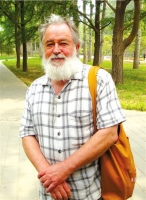阅读比尔·波特 Bill Porter在百家争鸣的作品!!! | |||
比尔波特说他最早受到中国文化的影响,是在哥伦比亚大学攻读人类学博士期间,他接触了一些中国的佛道经典,深感其中的微言大义,于是开始苦读中文。两年后,他中断了学业,搬到台湾,在寺庙里过起暮鼓晨钟的简单生活:一日三餐素食,一个房间,一张床,一顶蚊帐,没有钞票。这样的日子一过就是三年,直到他结识了做庄子研究的中国女友——后来的妻子后,才离开寺庙,隐居在竹子湖边的一个家舍里,以“赤松”的笔名翻译出版了《寒山诗集》、《石屋山居诗集》和《菩提达摩禅法》等英文著作,并萌生了探访传说中的隐士的念头。
一开始,对于是否还能在中国找到山林隐士,比尔波特心里并没有谱,他说,在他动身前往中国大陆寻访隐士前两个星期,台湾的一位官员还告诉他,别浪费时间了,大陆现在连和尚都没有,哪有隐士?但他不信,非要实地察看。1989年,他邀约上自己的朋友,一位摄影师史蒂芬,踏上了终南山探访之旅。那些摄于幽谷悬崖中的照片记录了此行的艰难:古老破败的寺庙与道观、万丈深渊和铁链。而比尔波特也用自己的笔详细记录下他与隐士们的交流,以及他所看到的隐士们的生活现状。
从1993起,比尔·波特和他的太太与两个孩子就一直居住在离西雅图两小时远的乡村居所。他每年都会以导游身份到中国来几次,他走过丝绸之路,到过少数民族聚居地,有时受邀到大学演讲,借此赚的钱,可以让他养活家人,并译自己喜欢的东西。诗歌以及佛经。探访隐士之前,他也曾有过住茅屋的想法,见过这些隐士之后,反而打消了这个念头。现在的生活,他觉得已经够了。“陶渊明是我的理想。翻译佛经就是我的道。”“很多西方人因为我的书,想要过隐士的生活。我对他们说,当隐士之前,还有一条路要走,你要学习很多的东西。那些在终南山隐修的人,就像在读哈佛大学,而我已经毕业了。”
翻译同样是比尔·波特热衷的话题。他形容译诗就像跳舞,译李白诗,就是在和李白跳舞,而译韦应物,跳的一定是华尔兹。那要是翻译释迦牟尼呢?那就是在和佛陀对坐。哪个更难?他说,各有各的难。“有的人翻译也像跳舞,不过是把自己的脚放在别人脚上。我觉得不是。语言只是窗户,你得透过它,看到它后面的东西。这也就是中国人所讲的意在言外,你得勘破,才能译得准确。”而译佛经,也还需要面对不同的佛经版本,这时要借助些梵文知识,好在,华盛顿大学东方图书馆最好,我可以从中得到帮助。说这话的比尔·波特,正坐在日坛公园旁边的茶苑。眼前是泡好的一壶大红袍,他时不时会品一杯,脸上绽出笑意与陶醉:“香,好久没喝过这样的好茶。”
Early life
He was raised in mountainous Idaho. After serving three years in the U.S. Army (refusing assignment in Vietnam and subsequently being reassigned as a clerk in Germany), he took a degree in anthropology from University of California, Santa Barbara and went on to graduate studies in language (Chinese) and anthropology at Columbia University, but dropped out in 1972 to go to the Fo Kwang Shan Buddhist monastery in Taiwan.
Taoism and Buddhism
In the years following, he lived in Taiwan and Hong Kong. Since 1989 he has traveled extensively in China, both as a journalist and on his own. He adopted a Chinese pen-name (hào) "Red Pine" (赤松 "Chi Song"), after the legendary Taoist immortal. In 1993, after 22 years in East Asia, he returned to the US. In 1999 and 2000, he taught Buddhism and Taoism at the City of Ten Thousand Buddhas. He now lives in Port Townsend, Washington.
His book Road to Heaven prompted Edward A. Burger to seek out and study with Buddhist hermits in the Zhongnan mountains of China and direct the 2005 film Amongst White Clouds.
Work
P’u Ming’s Oxherding Pictures and Verses. Empty Bowl, 1983. (translator)
Cold Mountain Poems. Copper Canyon Press, 1983. (translator)
Mountain Poems of Stonehouse. Empty Bowl, 1985. (translator)
The Zen Teaching of Bodhidharma. Empty Bowl, 1987; North Point Press, 1989. (translator)
Road to Heaven: Encounters with Chinese Hermits. Mercury House, 1993. (author)
Guide to Capturing a Plum Blossom by Sung Po-jen. Mercury House, 1995. (translator)
Lao-tzu's Taoteching: with Selected Commentaries of the Past 2000 Years. Mercury House, 1996. (translator and editor)
The Zen Works of Stonehouse: Poems and Talks of a Fourteenth-Century Chinese Hermit. Mercury House, 1997. (translator)
The Clouds Should Know Me by Now: Buddhist Poet Monks of China. Wisdom Publications, 1998. (editor, with Mike O'Connor; and contributing translator)
The Collected Songs of Cold Mountain. Copper Canyon Press, 2000. (translator and editor)
Diamond Sutra. Counterpoint, 2001. (translator and extensive commentary)
Poems of the Masters: China's Classic Anthology of T'ang and Sung Dynasty Verse. Copper Canyon Press, 2003. (translator)
The Heart Sutra: the Womb of Buddhas. Washington: Shoemaker & Hoard, 2004. (translator w. extensive commentary)
Zen Baggage: A Pilgrimage to China. Counterpoint, 2008. (author)
In Such Hard Times: The Poetry of Wei Ying-wu. Copper Canyon Press, July 1, 2009. (translator). Winner of the American Literary Translators Association (ALTA)'s inaugural Lucien Stryk Asian Translation Prize in 2010.
Note
^ a b KJ Interviews: Dancing with Words: Red Pine's Path into the Heart of Buddhism
^ Pine 2000, p. 309
^ Amongst White Cloud
Reference
Pine, Red (2000). The Collected Songs of Cold Mountain. ISBN 1-55659-140-3
